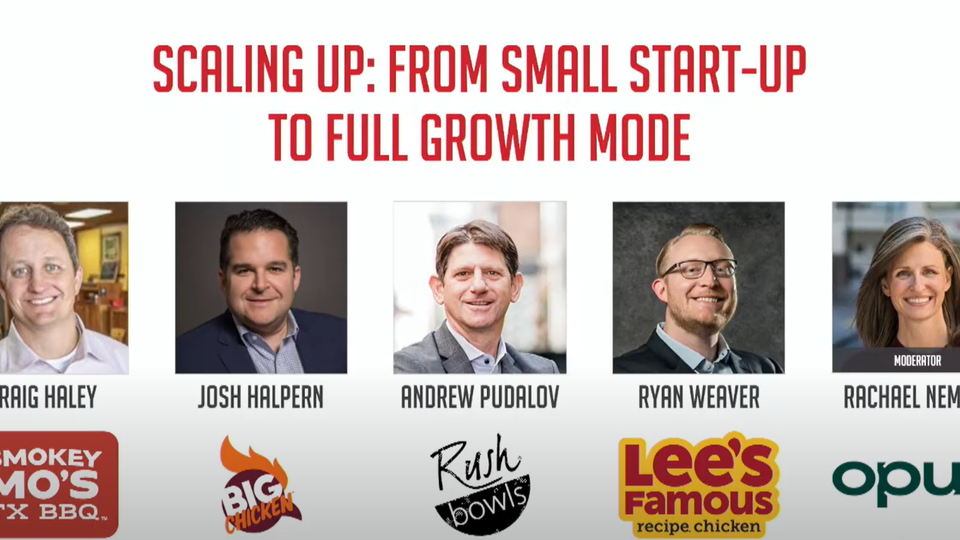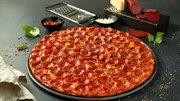Franchising
How to scale up restaurant brands
It's one thing to have a great solo concept, it's quite another to scale up that concept into a franchise. A panel at the Restaurant Franchising and Innovation Summit looked at how restaurants can scale up from start up to full growth mode.

May 31, 2024 by Bradley Cooper — Editor, ATM Marketplace & Food Truck Operator
It's one thing to have a great solo concept, it's quite another to scale up that concept into a franchise. A panel at the Restaurant Franchising and Innovation Summit held in Kansas City, Missouri from March 24 to 26 looked at how restaurants can scale up from start up to full growth mode.
Rachael Nemeth, CEO and co-founder of Opus Training, moderated the discussion with Craig Haley, president of Smokey Mo's TX BBQ, Josh Halpern, CEO of Big Chicken, Andrew Pudalov, founder and CEO of Rush Bowls and Ryan Weaver, CEO of Lee's Famous Recipe Chicken.
Location
When examining growth strategies, it is going to vary depending on where your restaurant is at. For example, Haley said that Smokey Mo's TX BBQ was essentially mom and pop led, and the founder's vision made a big impact. However, in order to grow they had to "take it down to the studs" due to several elements that had been put on the foundation that weren't helpful.
With Big Chicken on the other hand, due its founder being NBA player Shaquille O'Neal, it saw massive growth and had to be managed carefully.
"The question is how do you wrangle this growth into something that makes sense," Halpern said. He pointed out that they had to turn down 4,200 franchisee applications.
Pudalov also said that they are very selective about who they choose to franchise with because a bad partner in the right area won't be as successful as the right partner would be.
Pace
One huge issue in franchising or growth in general is finding the right pace of growth, especially in tougher economic circumstances.
Haley said that, "Building costs has gone up. Banking cost, finance cost has gone up." This in turn makes it difficult for franchisees, especially smaller ones who own one or two locations.
In order to handle these uncertainties, he said that Smokey Mo's TX BBQ has slowed down the pace of growth and expansion. Pudaluv agreed, saying they focus on sticking to the formulas so they can show a return on investment for franchisees and have clear projections for up to 2029.
"We go slow first to go faster later," Weaver said. Lee's Famous Chicken focuses on getting the data in from a few new locations first and get the process down so when they are ready for faster growth it will lead to a "flywheel effect."
Halpern however said that he didn't have control over the pace of growth because he will get calls from Shaq saying, "Hey brother we are going into the U.K. in April."
Instead, he focuses on making sure they have the right leadership in place and the puzzle pieces all available to support that growth because "the minute you stretch your team so much that they tear, growth stops."
Tech
Technology is a major component of supporting growth in restaurants. However, one major challenge can be picking the right technology tools to actually solve problems.
Halpern said you have to ask, "What's the problem you are trying to solve?" In Big Chicken's case, they use technology primarily to help franchisees understand and analyze costs and for training.
Haley agreed saying that tech "has to add value." You shouldn't just push solutions onto franchisees to standardize.
Pudaluv said it's important not to get distracted by "shiny new toys." As an example, although he believes AI will be transformational, it's key not to jump from A to B not A to Z, because we haven't yet figured out AI.
In a positive example of AI, Weaver said they have been able to use AI in the drive-thru because they have a franchisee with some experience with the tool and can show data on how much time it saves.
Training
Lastly, no growth strategy will succeed unless the training component is there to ensure consistency for the brand and the customer experience.
Halpern said one of the most important tactics to follow is to communicate to employees in a language they understand.
"I don't mean English, Spanish. Are you speaking to them as a 20-, 30- or 40-year-old? Every individual is their own individual brand," he said, pointing out that every generation is going to going to want to communicate on their own terms.
Haley agreed saying his restaurant is trying to be less scripted and instead teach to the outcome. For example, what is the food supposed to look like, what is the customer supposed to feel when they enter the restaurant?
Weaver said that as a franchisor they need to do more work on ensuring franchisees implement their training that they receive in their 7 week 'Chicken School.'
The important element in all of these tactics is consistency.
"Restaurants don't fail because they were bad ideas," Haley said. "Consistency is extremely hard."
In order to stay consistent, Haley said you should "start off with a plan. After 90 days, look back at that plan. A lot of people get punched in the face and they don't go back to the original plan."
 ChatGPT
ChatGPT Grok
Grok Perplexity
Perplexity Claude
Claude








